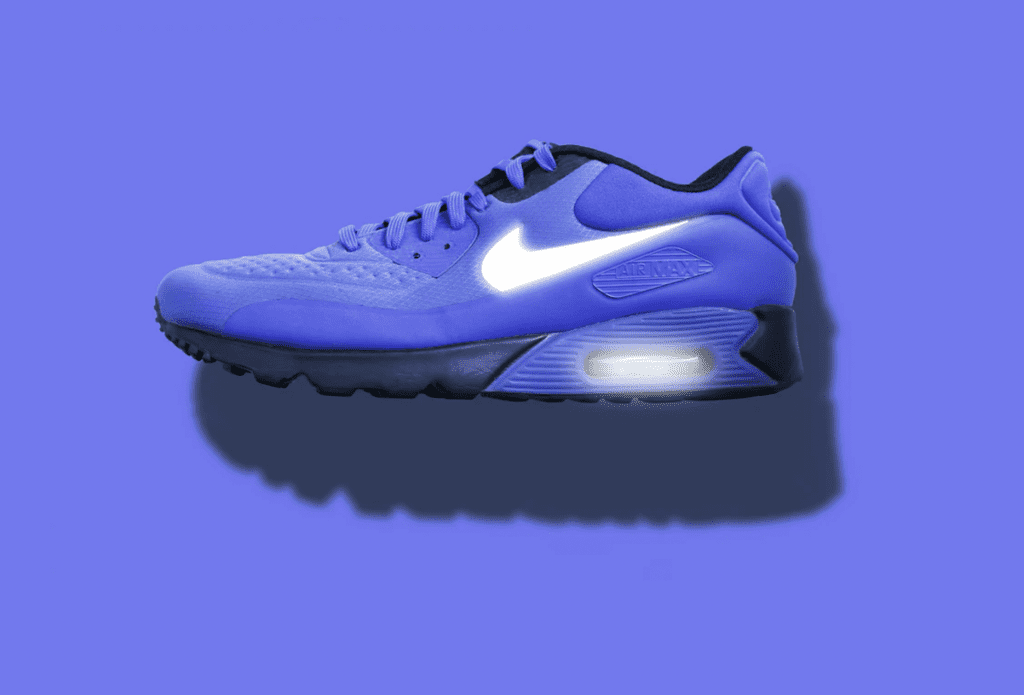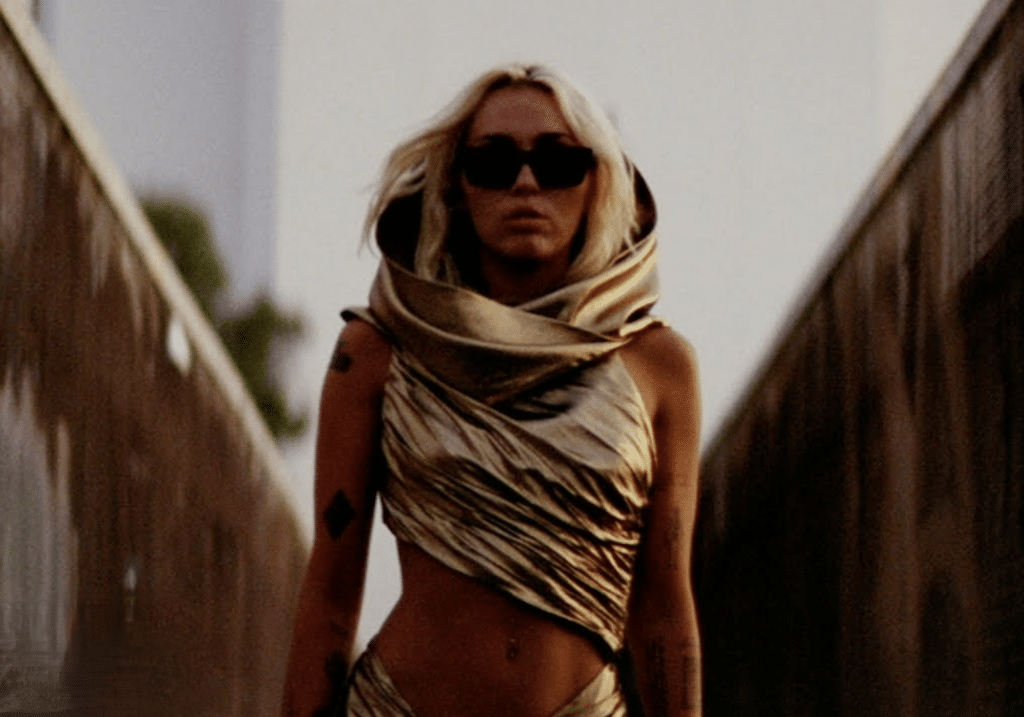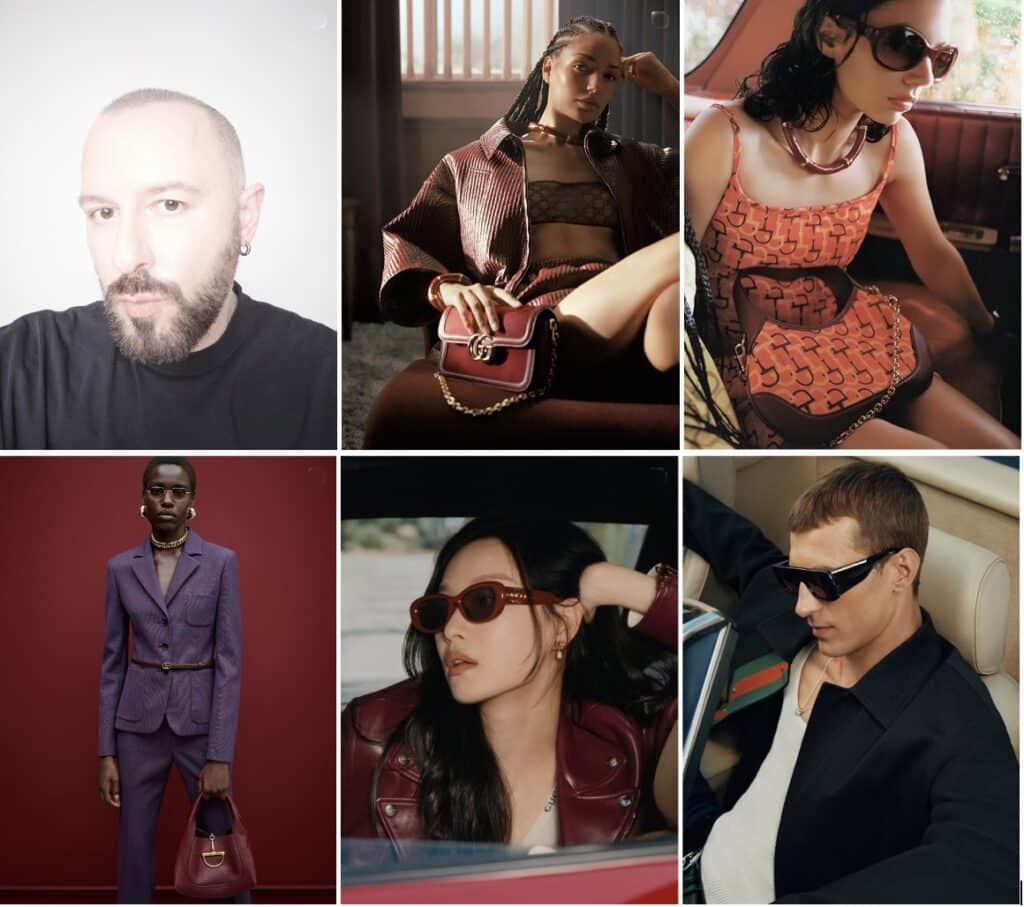Nike is preparing to head back into the metaverse if a handful of newly-filed trademark applications for registration and a string of hires is any indication. On the heels of partnering with gaming platform Roblox back in the 2019 and also receiving a utility patent from the U.S. Patent and Trademark Office (“USPTO”) for a “system and method for providing cryptographically secured digital assets” that same year, the Beaverton, Oregon-based sportswear titan filed seven new intent-to-use applications late last month for its most famous trademarks – word marks “Nike,” “Just Do It,” “Jordan,” and “Air Jordan,” its iconic swoosh logo, the Jordan silhouette logo, and a stylized combination of its name and the swoosh – for use on various virtual goods/services.
In the newly-filed trademark applications for registration (serial nos. 97095855, 97095944, 97096945, 97096236, 97096950, 97096952, and 97096366), as first spotted by trademark attorney Josh Gerben, counsel for Nike specifically points to a number of goods/services in connection with which the company intends to use its famed marks, including “downloadable virtual goods” (in Class 9), “retail store services featuring virtual goods” (Class 35), and “entertainment services, namely, providing on-line, non-downloadable virtual footwear, clothing, headwear, eyewear, bags, sports bags, backpacks, sports equipment, art, toys and accessories for use in virtual environments” (Class 41).
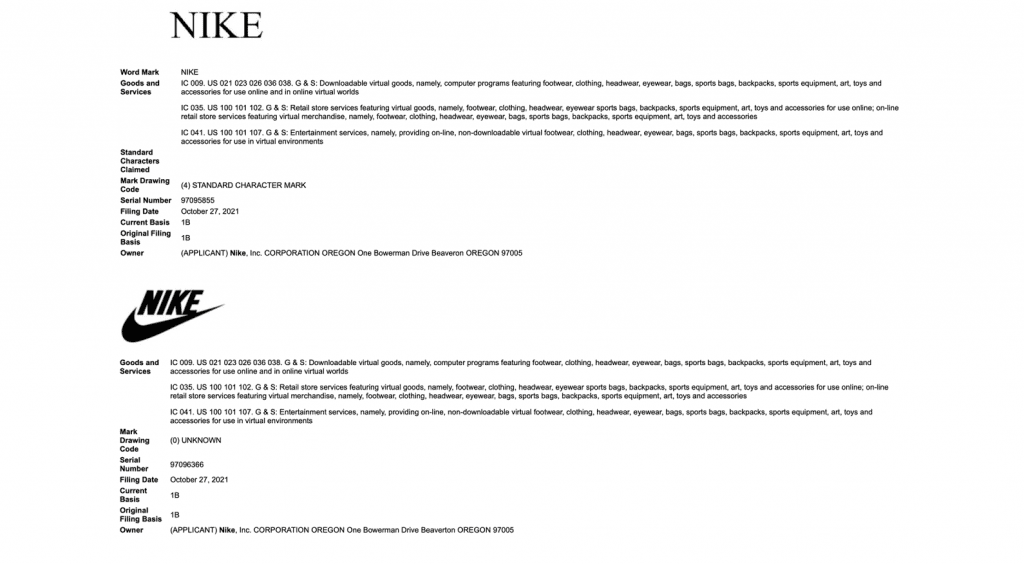
Meanwhile, outside of the U.S., Nike has filed identical applications with trademark offices in Singapore, Switzerland, Mexico, and Canada.
Almost 60-years-old, Nike – which currently boasts a market cap of $263.27 billion – maintains trademark rights in and a number of registrations for each of the aforementioned marks across an array of goods and services, with one of its registrations for the Nike name and another for its swoosh logo for use on “athletic shoes and uniforms,” for instance, dating back to 1974 and 1972, respectively. However, while Nike has a robust arsenal of trademark registrations for its many, many marks, it lacks registrations for virtual renderings of the aforementioned goods/services.
Nike’s lack of registrations does not mean that it is without trademark rights in the metaverse. After all, the company teamed up with Roblox back in March and April 2019 for an Air Max event in connection with which it created “exclusive bundles,” including virtual versions of its Air Max 270, Air Max 720, and Air VaporMax sneakers. That partnership was short-lived (it only ran from March 21 to April 11), and Nike and Roblox – which currently boasts more than 200 million monthly active users – have since gone their separate ways. As such, its trademark rights for use on virtual garments and sneakers likely are not very strong due to inconsistent use; hence, the intent-to-use filing basis.
Beyond that, though, Nike might already have rights in they space thanks to its partnerships with video game companies, such as Xbox, whose avatar marketplace currently lists at least one Nike-branded offering, which is presumably the result of a collab with the Swoosh.
Nike Sees Benefits in the Metaverse
It is not yet clear what exactly Nike’s ambitions look like in the metaverse; although it is worth noting that the company is currently looking to fill a number of “Virtual Material Designer” roles after bringing former Director of Innovation Engineering Andrew Schwartz into the newly-created Director of Metaverse Engineering job in September 2021. One of the virtual-focused positions that Nike is currently hiring for states that the candidate will have responsibilities that include “exploring, iterating, and visualizing new material concepts,” and notes that the individual “will achieve this through creating procedural materials that can be parameterized and shared with design, [and will] play a key role in redefining our digital landscape, ushering us into the metaverse, and growing our team’s capabilities.”
What is clear are the opportunities that exist for brands when it comes to virtual worlds. Given the rise of the metaverse (i.e., a virtual-reality space in which users can interact with a computer-generated environment and with other users – or as Nike’s Global Director of Technology Innovation Eric Redmond has described it, the metaverse is “the all-encompassing space in which all digital experience sits”), brands are rushing to engage with consumers in this medium by way of collaborations with the likes of Fortnite and Roblox, as well as through their own branded ventures.
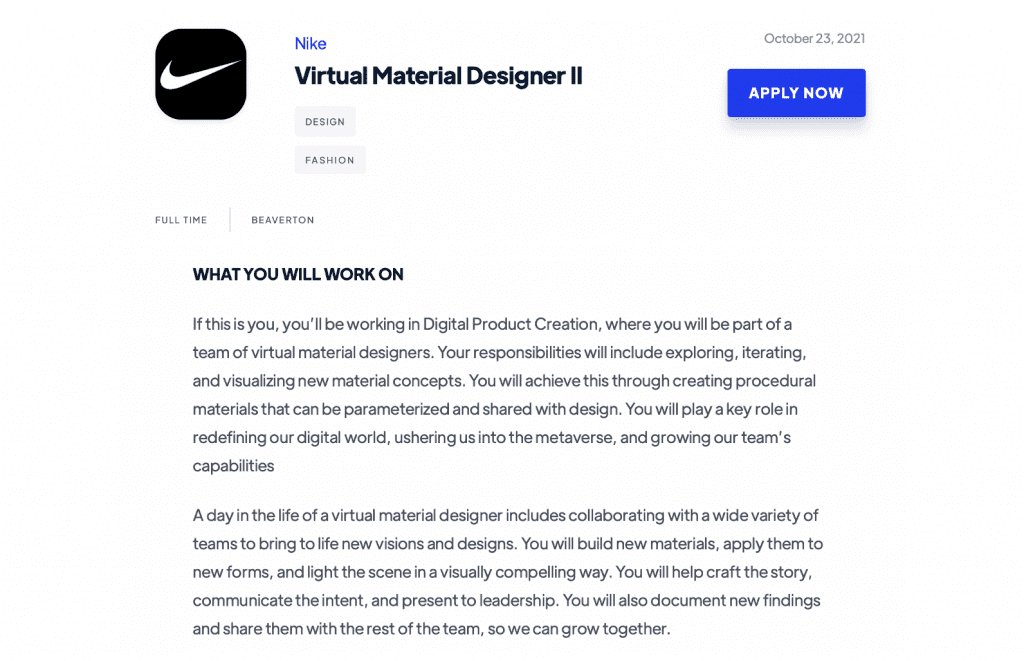
More than just a place to play games or engage with (and purchase) virtual fashion, the metaverse is “a living experience that exists consistently for everyone and in real time,” Matthew Ball, the Managing Partner of EpyllionCo and a venture partner at Makers Fund, previously stated, and in its current form, the “worlds and experiences” that the metaverse provides “have helped brands stay connected to consumers throughout the pandemic.”
Against the background, “Every brand and company will need a metaverse strategy,” according to Cathy Hackl, chief metaverse officer and CEO of metaverse-focused consulting agency Futures Intelligence Group, who says that brands’ presence in the metaverse will ultimately become as commonplace as companies’ having websites and/or being present on social media. Nike appears to be readying to join the likes of Warner Bros., Hyundai, Gucci, Burberry, and skincare company SK-II, among others, which have created their own virtual worlds, oftentimes own collaboration with existing platforms.
While much of the emphasis on these burgeoning digital ventures has centered on connecting with consumers during the pandemic, Reed Smith LLP’s Stacy Marcus and Deborah Bessner contend that these virtual worlds and experiences have enduring – and in many cases, practical – benefits. After all, things like virtual stores “are easily changeable and can adapt more quickly to consumer preferences and trends than a brick-and-mortar store can,” and it goes without saying that “the reach of a virtual world and experience goes well beyond that of a physical one,” making such initiatives attractive even after the world continues to reopen and COVID-related restrictions are eased.
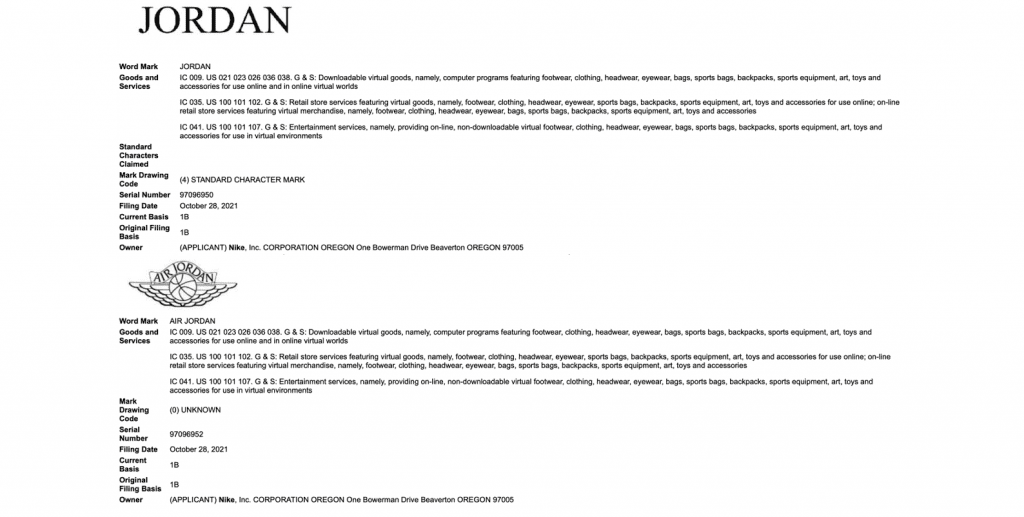
Virtual Brand Building
Brands are, unsurprisingly, considering the role – and protectability – of their branding when it comes to the metaverse. Not actually the first brand to file trademark applications that correspond with the virtual realm, TFL reported in September that E.l.f. Cosmetics, for instance, filed an intent-to-use application for registration for the “Crypto Cosmetics” mark in Class 9, and namely, for use in connection with “Digital media, namely, digital collectibles, digital tokens, non-fungible tokens, and digital art … to represent a collectible item and featuring collectible images, audio, videos, and digital art.”
Dating back before that, digital fashion brand RTFKT has been lodging applications with the USPTO for its name (which is pronounced “artifact”), and word marks like Meta Haze, Krypto Kush, Metamall, Metawear, Cybersneaker, and Metajacket, among others, as well as its logo, which consists of “a stylized design of a blade,” for use in connection with “downloadable virtual goods” and “virtual goods, namely, non-fungible digital asset tokens used with blockchain technology to represent a collectible item,” and in some cases, physical footwear products.
All the while, the number of applications in which “digital assets” are listed as goods/services has also been on the rise, albeit, a bit more gradually. The World Intellectual Property Organization’s database listed almost 750 applications for marks for use in connection with “digital assets” as of September. That is up from 460-something in 2020, roughly 500 in 2019, 710 in 2018, 193 in 2017, 48 in 48, 68 in 2015, and 54 in 2014.
And given the enduring appeal of virtual fashion, as well as NFTs, chances are, Nike will hardly be the last company to look to trademarks for its virtual endeavors. Brands will continue to look to the USPTO and other relevant trademark offices in order to amass registrations in this space, assuming, of course, that they are actually using such marks in “real” and virtual commerce.
UPDATED (November 18, 2021): On the heels of making headlines for filing a number of trademark applications for registration for virtual goods, Nike has teamed up with Roblox for Nikeland, a digital experience that enables fans of the sportswear giant to “connect, create, share experiences, compete,” and, of course, shop. In a release, Nike states, “There’s a new place on Roblox for Nike fans to connect, create, share experiences and compete: NIKELAND. Nike created this bespoke world with the backdrop of its world headquarters and inside Roblox’s immersive 3D space, building on its goal to turn sport and play into a lifestyle.” In addition to connecting and competing, fans can also shop in Nikeland, with the digital experience enabling users to “gear up in classics like the Air Force 1 and Nike Blazer and in new drops like the Air Force 1 Fontanka and the Air Max 2021,” of which can be found in the digital showroom, “along with a host of other Nike apparel staples like ACG and Nike Tech Pack.”







